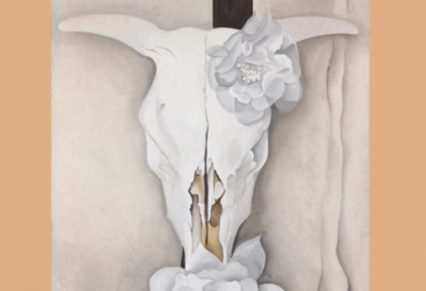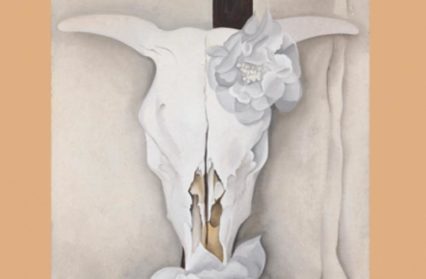Laura May Webb finds that Zoë Brigley’s third poetry collection, Hand and Skull, cuts right to the bone.

At first reading, Zoë Brigley’s third poetry collection appears to be an eclectic selection of poems traversing time periods and landscapes, juxtaposing harsh reality with abstract evocations; a disorientating polyphony composed of not only voices but paintings and photographs. It is not only the content of the poems that often takes the reader by surprise but the differing styles and methods, the positioning of the words on the page that disturbs and unsettles. The collection opens with a photograph of a woman’s hands caressing a horse skull, a striking image in black and white. This photograph is representative of what the author achieves in this collection: a brave acknowledgement of violence, a confrontation with its varying manifestations and caressing of the very bones of what is left in its wake.
Ac yn hynny guan y dan y meirych, a thorri y guefleu wrth y danned udunt, a’r clusteu wrth y penneu
`(Then he fell upon the horses and cut their lips from their teeth and their ears from their heads)
The very first poem, based on the Mabinogi, shows Brigley’s Welsh roots and is the first indication of the violence and brutality that characterises this collection. The inclusion of lines in the original Welsh lends the poem an air of Celtic mythology, suggestive of ancient brutality directed here at animals and women. The implicit comparison of women to wild horses is a recurring theme as is the exploitation, subjugation and consumption of women.
You know the women through every manmade thing
that men have used to trap them
Through Brigley’s poetry, we know women through her honest, unadorned, unmediated descriptions of the reactions of the women in her writing to the situations they face: rape, violence, marriage, motherhood, child loss, pregnancy and birth. We see women as pursued, taken against their will in a narrative harking back to Greek mythology. In ‘Dryad’, Brigley evokes Syrinx, turned to reeds, Pity turned to pine and Daphne turned to laurel to escape rape by the men who pursued them. In ‘The Eye in the Wall’, we see the male justification of the use of force and generational continuity, a suggestion of inherited sexual violence:
That time in the pine forest, she faced
him under a moonless, cloudy evening, at the edge
of frosted needles, near the brightly lit windows
of a small brick house: he wanted to fuck her where
children might look out at any moment, wanted
to fuck her nastily like his fat father fuckedhis thin mother.
Women are used, abused and silenced by men who dominate them, men in power. ‘Beatitudes for the Women’, ‘Emily Doe’ and ‘Sonnet for the Hole in the Glass’ are all reworkings of legal cases demonstrating the judgement of men, court judges, police officers upon and against women. These poems give a voice to the women they represent, the women who have been ‘trapped’ or ‘boxed’, by men, marriage, motherhood. Brigley refuses to be silenced and recruits an array of voices, past and present to resist. But it is a calm and measured protest. The matter-of-fact descriptions of violent, traumatic experiences are disturbing in themselves. The female protagonists seem to accept their circumstances at the same time that they challenge and reject them.
He opened the lens – and I did as I was told – […]
Every part of me he saw in fragments. […]
He had me boxed – until
my leaving – […]
Women’s resilience underestimated by men and supported in and by nature is a subtle undercurrent throughout the collection. Despite the violence and the oppression, Brigley repeatedly speaks the unspeakable. She does not try to make it more palatable. She knows what is expected but she does not conform. In ‘Letter to Leda on Getting Married’, Brigley says out loud all that must not be said, unspoken promises made between women, a type of toxic sisterhood that allows women to conform to male expectation and keeps secret women’s true thoughts and desires: ‘I’ll forget you said you still weren’t sure’, ‘I must not say that it isn’t enough to want children’. These expectations are challenged directly in ‘Rare’:
Men make of me some strange unearthly creature,
breathing in clouds for nourishment, but the truth
is that I like beefsteak, and I like it rare at that.
The mother archetype is stripped bare in the final part of the collection. Brigley’s descriptions of pregnancy, birth and miscarriage are raw and visceral and most importantly real. They are the words we feel but cannot express, the pain and the brutality of this uniquely female experience.
[…] You were born
in the Fall. I lay awake through the wee hours
as you spasmed inside. Your father drove us
to the hospital, and it was all
red: sky, leaves, and pavement: your
head a pointed star trapped
by my pelvic bone, but they trimmed, sliced,
opened me up, and out you came screaming,
slippery with my blood. No apology, […]‘Star’
You were the first, the one not
born, seen once onscreen shivering with excitement, or
pain. After you died, they scraped
you out of me. But I don’t know what they did
with what remained. Knotted in blue plastic, or combusting
from the basement incinerator, smoke hung with the first
unseasonal snow that year? […]‘Snow’
Brigley’s alternative portrayal of the mother figure is challenging but at the same time comforting. She voices our fears, our anguish, our lack of control and our loss, the parts of the experience that are often silenced and hidden away. The volume as a whole draws into the light those issues that are often hushed up, experiences that are uncomfortable for others to hear, women’s experiences too frequently shrouded in secrecy. It is stripping to the bone of those experiences and accepting and caressing the pain those experiences cause. Brigley takes the hands to the skull, feeling, exploring, accepting, nurturing. This collection is a painful release of trauma, denouncing and defiant. ‘Are women just a place to put things?’, Brigley asks in ‘Letter from Nemi’. In this collection, women are so much more. They are victims, survivors, they are held down and they rise, they are mothers and lovers and wives and wild horses. Brigley gathers up all the fragments of what it is to be a woman and weaves them together in this stunning collection which cuts and heals in equal measure.
Hand and Skull by Zoe Brigley is available now from Bloodaxe Books.
Laura May Webb is a regular contributor to Wales Arts Review.











